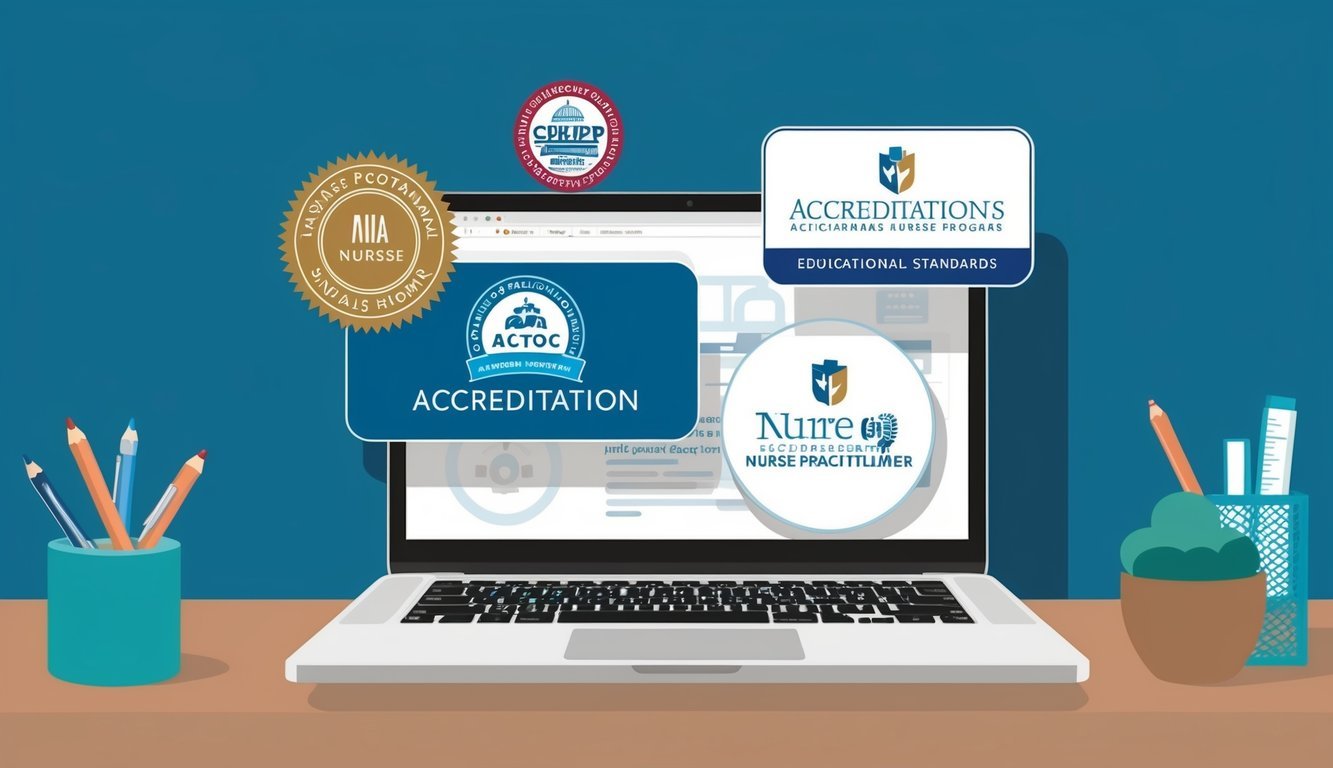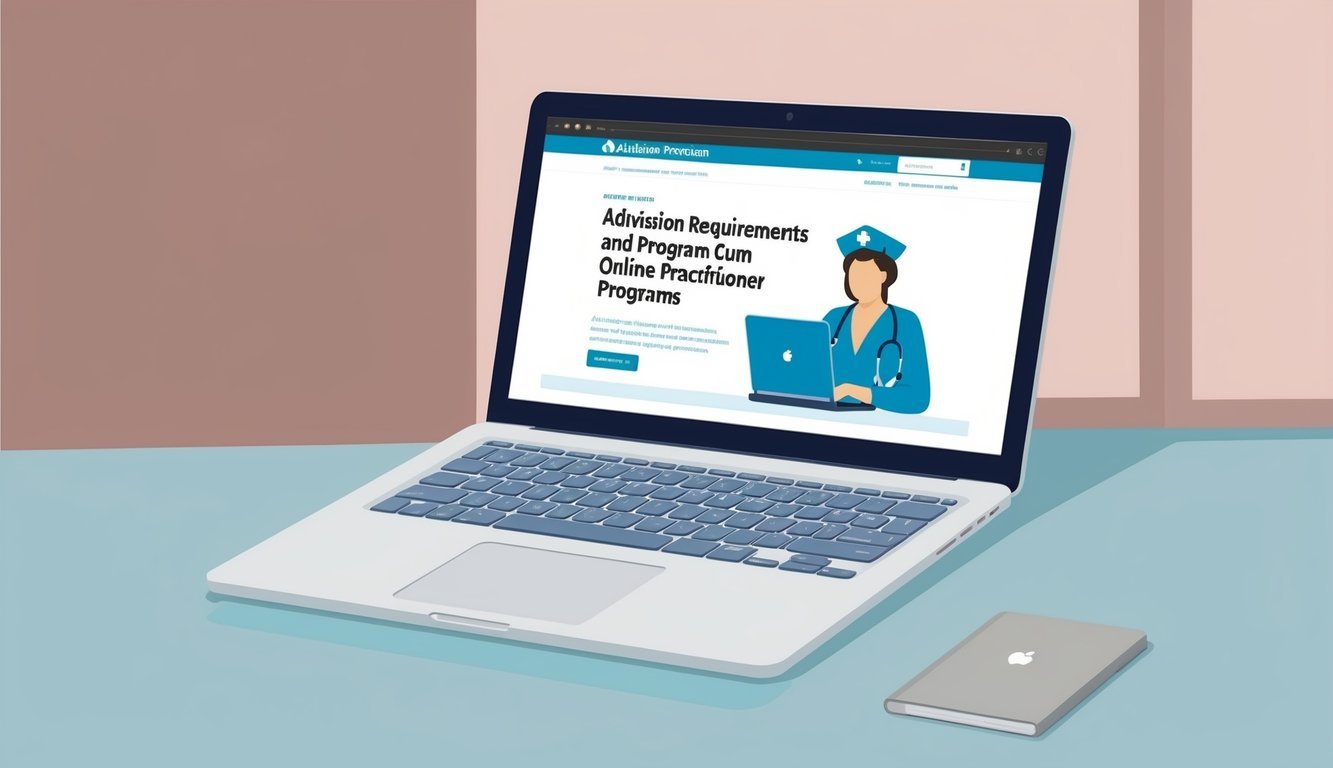As healthcare continues to evolve, the demand for qualified nurse practitioners is on the rise.
Online nurse practitioner programs offer a flexible and accessible pathway for aspiring NPs looking to advance their careers while maintaining their current commitments.
These programs provide the necessary education and clinical training to equip you with the skills needed to effectively serve patients in various settings.
Choosing the right program is crucial to your success in this field.
Many universities now offer accredited online options that allow you to tailor your learning experience, whether through a BSN-to-MSN route or specialized tracks such as family or psychiatric nurse practitioner programs.
Programs such as those offered by the University of Mississippi boast competitive pass rates and affordability, making them an attractive choice.
By enrolling in an online nurse practitioner program, you can gain the expertise needed to excel in a rewarding and impactful career.
With a combination of theoretical knowledge and practical experience, you will be well-prepared to meet the challenges of modern healthcare.
Overview of Online Nurse Practitioner Programs
Online nurse practitioner programs provide flexible and accessible pathways for aspiring nurse practitioners.
These programs are designed to equip you with the necessary skills for various specialized roles in healthcare, allowing you to balance your education with personal and professional commitments.
Understanding Nurse Practitioner Roles
As a nurse practitioner (NP), you will assume advanced clinical roles that require comprehensive training and knowledge.
NPs can focus on several specialties, including:
- Family Nurse Practitioner: Providing holistic care for individuals across all ages.
- Psychiatric Nurse Practitioner: Specializing in mental health and offering diagnoses and treatments for mental illnesses.
- Adult-Gerontology Nurse Practitioner: Focusing on adults, including the elderly, to manage complex health issues.
- Pediatric Nurse Practitioner: Gaining expertise in pediatric care, addressing the health needs of children and adolescents.
- Women’s Health Nurse Practitioner: Concentrating on women’s health issues, including reproductive and preventive care.
These roles require not just clinical capabilities but also leadership and advocacy skills to improve patient outcomes.
Advantages of Online Learning
Online learning offers significant advantages for those pursuing nurse practitioner programs.
Flexibility is paramount; you can study at your own pace and choose schedules that fit your lifestyle.
This arrangement allows you to manage work and family responsibilities effectively.
Additionally, online programs often have lower associated costs compared to traditional on-campus options.
You can save on commuting and housing expenses, making this an economically viable choice.
Many reputable institutions offer high-quality online programs that include interactive elements such as virtual simulations and online discussions, fostering meaningful peer interactions and faculty support.
Types of Nurse Practitioner Specializations
Nurse practitioner programs typically offer various specializations tailored to your interests and career goals.
Here is a brief overview of the common specializations available:
| Specialization | Focus Area |
|---|---|
| Family Nurse Practitioner | Comprehensive care across the lifespan |
| Psychiatric Nurse Practitioner | Mental health assessment and treatment |
| Adult-Gerontology Nurse Practitioner | Care for adults, including elderly patients |
| Pediatric Nurse Practitioner | Medical care for infants, children, and teens |
| Women’s Health Nurse Practitioner | Focused on female health issues |
Each specialization prepares you with the relevant skills and knowledge necessary for specific patient populations and healthcare settings.
Be sure to choose a program that aligns with your career aspirations and meets accreditation standards.
For more insights, you can explore articles on the best online nurse practitioner programs.
Accreditation and Educational Standards

Accreditation is crucial in ensuring that online nurse practitioner programs meet established educational standards.
Understanding the different accrediting bodies and their roles helps you make informed decisions about where to pursue your education.
Importance of Accreditation
Accreditation signifies that a program has met rigorous academic standards, ensuring quality in education and training.
This not only impacts the credibility of your degree but also influences your ability to secure financial aid and qualify for licensure.
Many employers prefer graduates from accredited programs, which can enhance your job prospects.
Additionally, accreditation enables you to transfer credits if you decide to pursue further education.
Always verify that your chosen program is recognized by reputable accrediting organizations.
Accrediting Bodies and Their Significance
Two primary accrediting bodies for nursing programs include the Commission on Collegiate Nursing Education (CCNE) and the Accreditation Commission for Education in Nursing (ACEN).
| Accrediting Body | Focus Area | Significance |
|---|---|---|
| CCNE | Baccalaureate and Graduate Nursing Programs | Ensures standards for higher education institutions. |
| ACEN | All Levels of Nursing Education | Comprehensive accreditation for diploma, associate, baccalaureate, and graduate nursing programs. |
CCNE accreditation is particularly important for online nurse practitioner programs, ensuring that they maintain the quality necessary for clinical practice.
Selecting an accredited program can help you advance your career and ensure a solid educational foundation.
For more information, you can visit CCNE.
Admission Requirements and Program Curriculum

Gaining admission to online nurse practitioner programs requires meeting specific prerequisites and understanding the curriculum structure.
This section outlines critical entry requirements and the essential courses you will encounter in the program.
Entry Prerequisites for NP Programs
To apply for online nurse practitioner programs, you must hold a valid RN license, typically earned after completing an accredited nursing program.
Most institutions require a Bachelor of Science in Nursing (BSN) with a minimum cumulative GPA of 3.0.
Specific programs may have additional prerequisites:
- At least one year of clinical experience as a practicing nurse.
- Completed foundational courses including pathophysiology and nursing research.
Check with individual programs for exact admission requirements, as they may vary.
For example, Baylor University’s DNP-FNP program emphasizes having a BSN and practical nursing experience for admission.
Core Courses and Specialized Tracks
Most online MSN nurse practitioner programs feature a rigorous curriculum designed to equip you with essential skills for advanced nursing practice.
Core courses usually include:
| Course Name | Focus Area |
|---|---|
| Advanced Health Assessment | Patient evaluation techniques |
| Pharmacology | Medication management |
| Evidence-Based Practice | Research application in nursing |
| Pathophysiology | Understanding disease processes |
In addition to core courses, specialized tracks may include:
- Family Nurse Practitioner (FNP)
- Pediatric Nurse Practitioner (PNP)
- Psychiatric-Mental Health Nurse Practitioner (PMHNP)
Each track tailors the course content to meet the unique demands of various patient populations, preparing you for specific roles in nursing practice.
Clinical and Technology Integration
Integrating clinical practice and technology is essential in nurse practitioner education.
Many online programs require completing clinical hours in diverse healthcare settings, which can span adult and pediatric care environments.
You will also engage with distance learning tools, enhancing your learning experience through:
- Virtual simulations
- Online case studies
- Interactive discussions
These formats help you develop critical thinking skills applicable in real-world scenarios.
Ensure that your selected program meets clinical requirement standards to provide a comprehensive learning experience.
Clinical Practicums and Hands-On Experience
Gaining practical experience through clinical practicums is crucial in nurse practitioner programs.
These experiences ensure that you acquire essential skills in patient care while integrating online coursework with real-world applications.
Clinical Hours and Direct Patient Care
Most nurse practitioner programs require a specific number of clinical hours that involve direct patient care.
For example, programs may mandate around 650 clinical hours in areas such as adult care, pediatric care, and more specialized fields.
During these hours, you will work under the supervision of experienced professionals, allowing you to apply theoretical knowledge to practical scenarios.
Each program may have unique paths to fulfill these requirements, including:
- Pediatric care
- Geriatric care
- Women’s health
Make sure to review your program’s guidelines to understand how clinical hours align with your future career goals.
Simulation and Campus Immersions
In addition to clinical hours, many programs incorporate simulation and campus immersion experiences.
These components provide opportunities to practice skills in a controlled environment.
Simulation labs enable you to engage with advanced technology that mimics real-life situations.
You can work on scenarios such as emergency care or chronic disease management, emphasizing key skills necessary for your role.
Campus immersion experiences enhance this aspect by allowing you to collaborate directly with peers and instructors.
This interaction supports the development of practical skills and professional relationships, enriching your educational experience.
Programs like the one at USAHS offer structured opportunities for both clinical hours and immersive experiences, combining online options with hands-on training.
Career Outcomes and Advancements in Nursing
As you advance in your nursing career, transitioning from a registered nurse (RN) to a nurse practitioner (NP) opens numerous opportunities for professional development.
This progression allows you to impact patient care significantly while positioning yourself for leadership roles and involvement in nursing research and healthcare policy.
Transitioning from RN to NP
Transitioning from an RN to an NP involves obtaining advanced practice nursing education, typically through a master’s or doctoral program.
This transition enhances your clinical skills and knowledge, allowing you to assess, diagnose, and manage patient care more comprehensively.
You will gain expertise in specific areas such as family health, pediatric care, or psychiatric mental health.
Many programs are designed to be flexible, often available online, making it easier for you to balance work and study commitments.
Certification upon graduation not only increases your earning potential but also opens doors to practice in primary, specialty, and underserved areas.
Advancement Opportunities and Leadership Roles
Nurse practitioners play a vital role in healthcare, especially in leadership positions.
As an NP, you can pursue various roles, including clinical leadership, nursing administration, or policy-making positions.
Your advanced training prepares you to take on these responsibilities effectively.
Many NPs lead interprofessional teams that collaborate to improve patient outcomes.
This is crucial in multicultural settings and for addressing the needs of underserved populations.
Participating in leadership roles enables you to advocate for better healthcare practices and influence healthcare policy, driving systemic change.
Nursing Research and Healthcare Policy
Engaging in nursing research allows you to contribute to evidence-based practices that enhance patient care quality.
As an NP, you are positioned to identify and analyze gaps in healthcare delivery and propose solutions based on research findings.
Additionally, involvement in healthcare policy ensures that nursing perspectives are integrated into legislative discussions.
You can advocate for policies that improve health access for diverse populations and ensure equitable healthcare delivery.
Your role in shaping healthcare policies can significantly enhance service delivery and patient outcomes in both local and broader contexts.
Top Institutions and Programs
When considering online nurse practitioner (NP) programs, you need to know the leading institutions and their specific offerings.
This section will highlight premier online NP programs and compare key features that matter most to future nursing professionals.
Highlighting Premier Online NP Programs
Several institutions stand out in the field of online nurse practitioner education.
Notable programs include:
-
George Washington University
- George Washington University offers various NP specializations with a strong focus on leadership.
-
Duke University
- Duke University is known for its innovative curriculum and top-tier faculty. They provide options such as Family and Pediatric Nurse Practitioner tracks.
-
Georgetown University
- Georgetown University features a blend of online and on-site courses. They emphasize clinical practice and ethical care.
-
Drexel University
- Drexel University provides flexible scheduling with a variety of specializations and high NCLEX-RN pass rates.
-
Frontier Nursing University
- Frontier Nursing University specializes in midwifery and family nursing. They are known for their rural health focus and comprehensive training.
These programs are recognized for their rigorous standards and successful graduate outcomes, preparing you for various roles in healthcare.
Comparing Program Features and Outcomes
When evaluating online NP programs, you should consider the following features:
| University | NCLEX-RN Pass Rate | Program Length | Specializations Offered |
|---|---|---|---|
| George Washington University | 93% | 2-3 years | FNP, PMHNP |
| Duke University | 95% | 2-4 years | FNP, Adult-Gerontology NP |
| Georgetown University | 91% | 2-3 years | FNP, NP in Nurse-Midwifery |
| Drexel University | 94% | 2-3 years | Family, Adult-Gerontology |
| Frontier Nursing University | 90% | 2-4 years | Midwifery, Family NP |
These features are crucial when selecting a program that aligns with your career goals.
Programs with high NCLEX-RN pass rates often indicate strong support and training standards.
This increases your chances of success in your future career.

